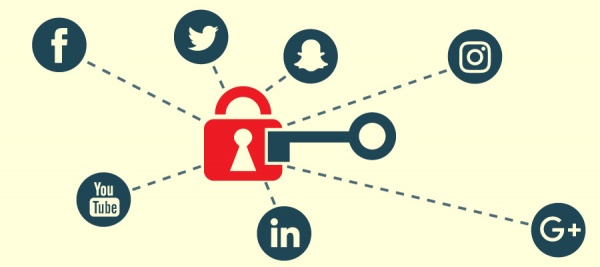Difference between revisions of "Digital Privacy associated with advertisements"
(→Bias) |
(→Privacy and Misuse of private information) |
||
| Line 87: | Line 87: | ||
Most of the social media and internet service require an account to perform any operations. For example, you need a google account to access resources like Google Drive and Gmail. If you are using google chrome, you may have stored your username and password in the chrome keychain. This requires the companies to be ethical towards user privacy. "When you use our services, you’re trusting us with your information. We understand this is a big responsibility and work hard to protect your information and put you in control." said in the google privacy and information page. <ref>https://policies.google.com/privacy?hl=en-US</ref> | Most of the social media and internet service require an account to perform any operations. For example, you need a google account to access resources like Google Drive and Gmail. If you are using google chrome, you may have stored your username and password in the chrome keychain. This requires the companies to be ethical towards user privacy. "When you use our services, you’re trusting us with your information. We understand this is a big responsibility and work hard to protect your information and put you in control." said in the google privacy and information page. <ref>https://policies.google.com/privacy?hl=en-US</ref> | ||
<br> <br> | <br> <br> | ||
| − | Even the employees of these big companies complain the unethical use of information to make profit. Facebook employees say Mark Zuckerberg's obsession with growth has overridden ethical concerns and allowed hate speech and incitements to violence to spread unchecked, internal messages leaked to media outlets show. <ref>https://nypost.com/2021/10/25/facebook-employees-flag-ethical-concerns-rip-zuckerberg/</ref> In 2018, news broke that Facebook had sold information from tens of millions of users to Cambridge Analytica LLC, which used the data to profile voters and target ads toward them in the 2016 election. At the time, the FTC accused Facebook of making deceptive representations to its users about how it shares and protects their data. <ref>https://news.bloomberglaw.com/antitrust/facebook-haunted-by-privacy-issues-as-ftc-boosts-antitrust-case</ref> The agency also mentioned that Facebook agreed in 2019 to pay a $5 billion penalty to settle the FTC charges that the company violated a 2012 order regarding its data privacy practices by “deceiving users about their ability to control the privacy of their personal information.”<ref>https://news.bloomberglaw.com/antitrust/facebook-haunted-by-privacy-issues-as-ftc-boosts-antitrust-case</ref> “The FTC’s theory is that one would expect that if it didn’t have market power, people would shift to competitors,” said Benjamin Sirota, an antitrust lawyer with Kobre & Kim LLP who previously worked in the DOJ’s Antitrust Division. “The FTC is depicting the degradation in privacy as confirmation essentially that Facebook has market power,” he said.<ref>https://news.bloomberglaw.com/antitrust/facebook-haunted-by-privacy-issues-as-ftc-boosts-antitrust-case</ref> | + | Even the employees of these big companies complain the unethical use of information to make profit. Facebook employees say Mark Zuckerberg's obsession with growth has overridden ethical concerns and allowed hate speech and incitements to violence to spread unchecked, internal messages leaked to media outlets show. <ref>https://nypost.com/2021/10/25/facebook-employees-flag-ethical-concerns-rip-zuckerberg/</ref> In 2018, news broke that Facebook had sold information from tens of millions of users to Cambridge Analytica LLC, which used the data to profile voters and target ads toward them in the 2016 election. At the time, the FTC accused Facebook of making deceptive representations to its users about how it shares and protects their data. <ref>https://news.bloomberglaw.com/antitrust/facebook-haunted-by-privacy-issues-as-ftc-boosts-antitrust-case</ref> The agency also mentioned that Facebook agreed in 2019 to pay a $5 billion penalty to settle the FTC charges that the company violated a 2012 order regarding its data privacy practices by “deceiving users about their ability to control the privacy of their personal information.”<ref>https://news.bloomberglaw.com/antitrust/facebook-haunted-by-privacy-issues-as-ftc-boosts-antitrust-case</ref> “The FTC’s theory is that one would expect that if it didn’t have market power, people would shift to competitors,” said Benjamin Sirota, an antitrust lawyer with Kobre & Kim LLP who previously worked in the DOJ’s Antitrust Division. “The FTC is depicting the degradation in privacy as confirmation essentially that Facebook has market power,” he said.<ref>https://news.bloomberglaw.com/antitrust/facebook-haunted-by-privacy-issues-as-ftc-boosts-antitrust-case</ref> As in the Facebook advertisement case study stated, Facebook even has the probability to listen to users' private conversation and promote advertisements based on their private conversation, which is widely considered unethical by many users. |
<br> <br> | <br> <br> | ||
There has been a significant number of concerns towards misuse of data privacy. Google has specified what information they collect: "We collect information to provide better services to all our users — from figuring out basic stuff like which language you speak, to more complex things like which ads you’ll find most useful, the people who matter most to you online, or which YouTube videos you might like. The information Google collects, and how that information is used, depends on how you use our services and how you manage your privacy controls." <ref>https://policies.google.com/privacy?hl=en-US</ref> However, people don't really trust Google for their privacy claims. "The Google of 2008 is a different beast entirely. It's a company accused of privacy violations in the states and abroad. It's a company whose fast-broadening reach has given it unchecked power. And, it's a company that last month came within three hours of a Department of Justice antitrust suit." said by John Paczkowski<ref>https://consumerwatchdog.org/blog/people-dont-trust-google-anymore</ref> “When I started at Google, there was a sense that we really believed in the power of technology to make the world a better place,” LaJeunesse said. “It’s not like that any more.” <ref>theguardian.com/technology/2020/jan/03/google-executive-human-rights-activism</ref> | There has been a significant number of concerns towards misuse of data privacy. Google has specified what information they collect: "We collect information to provide better services to all our users — from figuring out basic stuff like which language you speak, to more complex things like which ads you’ll find most useful, the people who matter most to you online, or which YouTube videos you might like. The information Google collects, and how that information is used, depends on how you use our services and how you manage your privacy controls." <ref>https://policies.google.com/privacy?hl=en-US</ref> However, people don't really trust Google for their privacy claims. "The Google of 2008 is a different beast entirely. It's a company accused of privacy violations in the states and abroad. It's a company whose fast-broadening reach has given it unchecked power. And, it's a company that last month came within three hours of a Department of Justice antitrust suit." said by John Paczkowski<ref>https://consumerwatchdog.org/blog/people-dont-trust-google-anymore</ref> “When I started at Google, there was a sense that we really believed in the power of technology to make the world a better place,” LaJeunesse said. “It’s not like that any more.” <ref>theguardian.com/technology/2020/jan/03/google-executive-human-rights-activism</ref> | ||
Revision as of 16:29, 28 January 2022
Privacy is the ability of an individual or group to seclude themselves or information about themselves, and thereby express themselves selectively. [1] Now entering the technology age, Digital privacy becomes more of a concern since people engage in online activities more and more frequently. Digital privacy is often used in contexts that promote advocacy on behalf of individual and consumer privacy rights in e-services and is typically used in opposition to the business practices of many e-marketers, businesses, and companies to collect and use such information and data. [2] Entering Internet Age, digital security and privacy become more closely related to every individual.
Advertising is a marketing communication that employs an openly sponsored, non-personal message to promote or sell a product, service or idea. Sponsors of advertising are typically businesses wishing to promote their products or services.
[3] Advertising changes its form in time. In the Internet Age, business gradually switch their advertisement from traditional media to new media, social media advertising for example. The main internet advertisement companies include Alphabet Inc. (Google, YouTube) and Meta Platforms Inc. (Facebook, Instagram).
Internet Advertising is closely associated with Digital Privacy these days. Companies use technologies like cookies to get information of the user and use that information to better sell their advertisements. Ethical issues like should companies make profit of user privacy from advertisement always arise these days. "Targeted adverts are one of the biggest moneymakers for Facebook. By utilising the vast amount of personal data from the 1.71 billion active users, the social media giant can tailor adverts to suit your situation." [4] Especially for large companies, users' private information is easy to track since they have to make google, facebook accounts in order to connect with the world on internet. Many ethical issues arise as whether it is ethical for big tech companies to make profit using their users' private information. Since user's information is highly related to the advertisement income, so the problem is inevitable.
Contents
Digital Privacy And Personal Data Collection
The advertisement distribution algorithm relies heavily on personal information these days. The wide application of recommender system, a machine learning-based content delivery algorithm, recommends new content by using the knowledge of user preference. The data used to predict user preference can be user habit or even sensitive data like address and search history. Some companies even benefit from selling these personal information. The ethical concern of digital privacy is highly related to different advertisement algorithms. The concept of Information transparency [5] was introduced to measure how much privacy has the platform exposed or utilized. In most of social media platforms, user information is collected unconsciously by the platform in the form of cookies, registration information, user habit, and etc. For example, most of platforms used to not have the option to turn off cookies; now even they provide the option since the law required them to do so, most people won't care and choose to accept all cookies for their convenience. In the perspective of Information transparency, these big tech companies are definitely not transparent enough when they try to collect user information. Users usually don't know how much of their private information has been exposed to the social media platform. For example, in the Yahoo! data breaches [6] , a lot of user's private information has been exposed during this attack.
Data Mining
Social Media can get to know a user's private information by data mining. Everyone can be tracked by the trail the leave on the internet. Users provide personal information that can include their name, birthdate, geographic location, and personal interests when they make an account. Additionally, companies collect data on user behaviors about how users interact on the website. For the most time, these information will be used to better serve customers or better deliver advertisements to target customers. However, companies sometimes even share users’ data with third-party entities without users’ knowledge or consent. [7]
Privacy concerns
In a 2014 survey, researchers found that 91% of Americans “agree” or “strongly agree” that people have lost control over how personal information is collected and used by all kinds of entities. [8]
In the survey, 80% of social media users said they were concerned about advertisers and businesses accessing the data they share on social media platforms, and 64% said the government should do more to regulate advertisers. [9]
In another survey last year, researchers found that just 9% of social media users were “very confident” that social media companies would protect their data. About half of users were not at all or not too confident their data were in safe hands. 61% of Americans in the survey have said they would like to do more to protect their privacy. Additionally, two-thirds have said current laws are not good enough in protecting people’s privacy, and 64% support more regulation of advertisers. [10]
Advertisement Case studies
Advertisement are widely used by large tech companies and they have different strategies and algorithms to distribute the content. Here are some case studies of typical advertisement practices.
Google Ads
Google LLC is an American multinational technology company that specializes in Internet-related services and products, which include online advertising technologies, a search engine, cloud computing, software, and hardware. Google generates most of its revenues from advertising. This includes sales of apps, purchases made in-app, digital content products on Google and YouTube, Android and licensing and service fees, including fees received for Google Cloud offerings. [11] More than 80% of Alphabet’s revenue comes from Google ads, which generated $147 billion in revenue last year. Google has been the market leader in online advertising for well over a decade and is expected to command nearly a 29% share of digital ad spending globally in 2021. [12]
Google nearly makes money entirely from advertisement. All other free services like Gmail, Google Drive, Google Map are used to better sell advertisements. The famous saying goes "if you don't pay for the product you are the product". Google use a specific sealed second price auction algorithm to sell their ads. For example, Google determine the ranking of advertisement when a user search with a certain term by their price and relativeness to the searching term. Google collect user data through a lot of ways including Google products like Gmail and Google Map, search histories to indicate user interest and preference, and google account to track personal and geological information.
Google places one or more cookies on each user's computer, which is used to track a person's web browsing on a large number of unrelated websites, and track their search history. If a user is logged into a Google service, Google also uses the cookies to record which Google Account is accessing each website and doing each search. Originally the cookie did not expire until 2038, although it could be manually deleted by the user or refused by setting a browser preference.[13] As of 2007, Google's cookie expired in two years, but renewed itself whenever a Google service is used.[13] As of 2011, Google said that it anonymizes the IP address data that it collects, after nine months, and the association between cookies and web accesses after 18 months.[14] As of 2016, Google's privacy policy does not promise anything about whether or when its records about the users' web browsing or searching are deleted from its records.[14]
Google shares this information with law enforcement and other government agencies upon receiving a request. The majority of these requests do not involve review or approval by any court or judge.[15]
YouTube Ads
YouTube is an American online video sharing and social media platform owned by Google. [16] Similar to Facebook, YouTube is a free website that earns revenue through advertising. Advertisers spend thousands of dollars to have their advertisements featured on top videos. YouTube enforces strict community and technical guidelines for all of its advertisements; the site aims to be fair and consistent with its policies in order to benefit its users, advertisers, and partners. YouTube reserves the right to reject any advertisement from the site that is deemed inappropriate or intrusive, and refunds are not issued for promotions in which the related advertisements disabled, or suspended due to policy violations. [17] YouTube sell their advertisement in a different way than Google as they insert advertisements at the beginning or middle of a video. Also, the censorship is more rigorous for YouTube advertisement to not include strong violence, language, sexual content, and "controversial or sensitive subjects and events, including subjects related to war, political conflicts, natural disasters and tragedies, even if graphic imagery is not shown", unless the content is "usually newsworthy or comedic and the creator's intent is to inform or entertain". [18] YouTube collects user information through search records, video preference, and video interactions. Then they promote advertisements fitting user interest.
Facebook Ads
Facebook is a online social media owned by Meta Platforms for people to connect all over the world. [19] Facebook has been criticized a lot for its user privacy issues, political inference by recommending users of particular preference for politicians, mass surveillance,[20] and malicious content like fake news, conspiracy, and hate speech.[21]
Last year, Facebook generated revenues of more than $85 billion and profits of more than $29 billion from its advertisements, according to the complaint. [22] Facebook Ads, the main moneymaker of Facebook, has also received a lot of criticism for unethical use of private information along with bias and discrimination towards the target users. Cases like Minorities receiving more low-cost housing ads, and women receiving more ads for biased jobs like secretary and nursing [23]. Facebook’s advertising exposed its deep tracking to user privacy which triggered user's concern for their privacy and data leak. [24] With only Facebook to turn to for that data, advertisers lose out on the lower prices and increased quality and innovation that come with additional competition, the agency said.
In 2010, the The Wall Street Journal discovered that many of Facebook's high rating applications were exposing privacy information to "dozens of advertising and Internet tracking companies". The technology that those apps used was an HTTP referer that transferred the user's identity information and even user's friends' identity information to advertising companies. A blog post by a member of Facebook's team exploited that "press reports have exaggerated the implications of sharing a user ID", though he still acknowledged that the Facebook apps were exposing the user information that violates Facebook's privacy policies.[25][26]
For years, users feel Facebook keep a recording of private conversations without their consent, just to better target user for customized advertisements. Users report that they have been promoted advertisements that they only mentioned in a private conversation and never searched for or liked relevant products explicitly. These thoughts and experiences lead to the belief that Facebook tracks user's private information without user consent.[27] Facebook claimed that they are not listening to private conversation; however, Facebook has lied about their private policies in the past.
Instagram Ads
Instagram is a photo and video sharing social networking platform. In April 2012, Facebook acquired the service for approximately US$1 billion in cash and stock. The app allows users to upload media that can be edited with filters and organized by hashtags. Posts can be shared publicly or with pre-approved followers. Users can browse other users' content by tags and locations and view trending content. Users can like photos and follow other users to add their content to a personal.[28]
In October 2013, Instagram announced that advertisements would be introduced to feed users in the United States. [29][30] The first image advertisements displayed on November 1, 2013.[31][32] Video ads was introduced about a year later on October 30, 2014.[33][34]
In February 2016, Instagram had 200,000 advertisers on the application.[35] The number of advertisement providers increased to 500,000 by September 2016,[36] and 1 million in March 2017.[37][38]
Ethical Dilemmas
Now we know that how big tech companies make money from advertisements and deliver their user the ads. Ethical concerns as big tech companies better target their users from utilizing private personal information. Also, there are many ethical issues besides leak of private information. For example, companies may promote malicious and discriminating advertisements utilizing private information from user.
Privacy and Misuse of private information
Most of the social media and internet service require an account to perform any operations. For example, you need a google account to access resources like Google Drive and Gmail. If you are using google chrome, you may have stored your username and password in the chrome keychain. This requires the companies to be ethical towards user privacy. "When you use our services, you’re trusting us with your information. We understand this is a big responsibility and work hard to protect your information and put you in control." said in the google privacy and information page. [39]
Even the employees of these big companies complain the unethical use of information to make profit. Facebook employees say Mark Zuckerberg's obsession with growth has overridden ethical concerns and allowed hate speech and incitements to violence to spread unchecked, internal messages leaked to media outlets show. [40] In 2018, news broke that Facebook had sold information from tens of millions of users to Cambridge Analytica LLC, which used the data to profile voters and target ads toward them in the 2016 election. At the time, the FTC accused Facebook of making deceptive representations to its users about how it shares and protects their data. [41] The agency also mentioned that Facebook agreed in 2019 to pay a $5 billion penalty to settle the FTC charges that the company violated a 2012 order regarding its data privacy practices by “deceiving users about their ability to control the privacy of their personal information.”[42] “The FTC’s theory is that one would expect that if it didn’t have market power, people would shift to competitors,” said Benjamin Sirota, an antitrust lawyer with Kobre & Kim LLP who previously worked in the DOJ’s Antitrust Division. “The FTC is depicting the degradation in privacy as confirmation essentially that Facebook has market power,” he said.[43] As in the Facebook advertisement case study stated, Facebook even has the probability to listen to users' private conversation and promote advertisements based on their private conversation, which is widely considered unethical by many users.
There has been a significant number of concerns towards misuse of data privacy. Google has specified what information they collect: "We collect information to provide better services to all our users — from figuring out basic stuff like which language you speak, to more complex things like which ads you’ll find most useful, the people who matter most to you online, or which YouTube videos you might like. The information Google collects, and how that information is used, depends on how you use our services and how you manage your privacy controls." [44] However, people don't really trust Google for their privacy claims. "The Google of 2008 is a different beast entirely. It's a company accused of privacy violations in the states and abroad. It's a company whose fast-broadening reach has given it unchecked power. And, it's a company that last month came within three hours of a Department of Justice antitrust suit." said by John Paczkowski[45] “When I started at Google, there was a sense that we really believed in the power of technology to make the world a better place,” LaJeunesse said. “It’s not like that any more.” [46]
Security
Advertisements pose great security concerns as advertisement providers like cannot really verify all of the advertisements and whether they are harmful. Scammers can even create fake business ads on Google Ads. The consumer body said Google only required users to have a Gmail account to create adverts and that, while it did review those that were submitted, it did not verify whether the business existed or was legitimate, nor ask for proof of ID. A Google spokesperson said protecting consumers and credible businesses was its top priority. They said: “We have strict advertising policies in place to protect consumers and prohibit ads that intentionally mislead users or fail to deliver on the promoted product or service. However, Fraudsters can create and post adverts for fake businesses on Google “within hours”, according to a Which? investigation. [47]
It can become very dangerous as advertisement distribution are designed with algorithms to promote to very related users. As the company use private information to better target their user in order to get a higher advertisement click rate, the security concern arises since frauds can easily break through the security check and send user spam message through advertisement.
Bias
The unethical use of private information also results in highly biased advertisements. Since the companies gather private information to target their users, they are likely to promote advertisements that are only related to the user's private information. That may result in the users receiving biased advertisements based on their identity stereotypes.
A 2016 investigation by ProPublica found that Facebook’s “ethnic affinities” tool could be used to exclude Black or Hispanic users from seeing specific ads. If such ads were for housing or job opportunities, the targeting could have been considered in violation of federal law. Facebook said in response it would bolster its anti-discrimination efforts, but a second ProPublica report in 2017 found the same problems existed. [48]
References
- ↑ https://en.wikipedia.org/wiki/Privacy
- ↑ https://en.wikipedia.org/wiki/Digital_privacy#:~:text=Digital%20privacy%20is%20often%20used,use%20such%20information%20and%20data.
- ↑ https://en.wikipedia.org/wiki/Advertising
- ↑ https://www.privacytrust.com/blog/how-facebook-makes-money-from-personal-data.html
- ↑ Turilli, Matteo, and Luciano Floridi (2009). "The Ethics of Information Transparency." Ethics and Information Technology. 11(2): 105-112. doi:10.1007/s10676-009-9187-9.
- ↑ https://en.wikipedia.org/wiki/Yahoo!_data_breaches
- ↑ https://sopa.tulane.edu/blog/key-social-media-privacy-issues-2020
- ↑ https://www.pewresearch.org/fact-tank/2018/03/27/americans-complicated-feelings-about-social-media-in-an-era-of-privacy-concerns/
- ↑ https://www.pewresearch.org/fact-tank/2018/03/27/americans-complicated-feelings-about-social-media-in-an-era-of-privacy-concerns/
- ↑ https://www.pewresearch.org/fact-tank/2018/03/27/americans-complicated-feelings-about-social-media-in-an-era-of-privacy-concerns/
- ↑ https://en.wikipedia.org/wiki/Google
- ↑ https://www.cnbc.com/2021/05/18/how-does-google-make-money-advertising-business-breakdown-.html
- ↑ 13.0 13.1 Agger, Michael · (October 10, 2007) · Google's Evil Eye: Does the Big G know too much about us? · work · 01-28-2022
- ↑ 14.0 14.1 "Privacy FAQ", Google, accessed October 16, 2011 and December 20, 2016
- ↑ "Transparency Report: User Data Requests", Google. Retrieved December 20, 2016.
- ↑ https://en.wikipedia.org/wiki/YouTube
- ↑ http://si410wiki.sites.uofmhosting.net/index.php/YouTube#cite_note-policies-19
- ↑ Robertson, Adi (September 1, 2016). "Why is YouTube being accused of censoring vloggers?". The Verge. Vox Media. Retrieved March 25, 2017.
- ↑ https://en.wikipedia.org/wiki/Facebook
- ↑ lastname, firstname · (May 24, 2018) · Facebook accused of conducting mass surveillance through its apps · work · 01-28-2022
- ↑ Mahdawi, Arwa · (December 21, 2018) · Is 2019 the year you should finally quit Facebook? | Arwa Mahdawi · work · 01-28-2022
- ↑ https://news.bloomberglaw.com/antitrust/facebook-haunted-by-privacy-issues-as-ftc-boosts-antitrust-case
- ↑ Hao, Karen. “Facebook's Ad-Serving Algorithm Discriminate by Gender and Race.” MIT Technology Review, 5 Apr. 2019, www.technologyreview.com/.
- ↑ https://news.bloomberglaw.com/antitrust/facebook-haunted-by-privacy-issues-as-ftc-boosts-antitrust-case
- ↑ lastname, firstname · (October 18, 2010) · Facebook in Privacy Breach · work · 01-28-2022
- ↑ Takahashi, Dean · (October 17, 2010) · WSJ reports Facebook apps — including banned LOLapps games — transmitted private user data · work · 01-28-2022
- ↑ lastname, firstname · (2019-06-28) · Is Facebook listening to me? Why those ads appear after you talk about things · work · 01-28-2022
- ↑ https://en.wikipedia.org/wiki/Instagram
- ↑ Panzarino, Matthew · (October 3, 2013) · Instagram To Start Showing In-Feed Video And Image Ads To US Users · work · AOL · 01-28-2022
- ↑ Covert, Adrian · (October 3, 2013) · Instagram: Now with ads · CNN · 01-28-2022
- ↑ Welch, Chris · (November 1, 2013) · Instagram launches ads with sponsored post from Michael Kors · work · 01-28-2022
- ↑ Van Grove, Jennifer · (November 1, 2013) · The preview is over: Instagram ads are here · work · CNET · 01-28-2022
- ↑ Kastrenakes, Jacob · (October 30, 2014) · Instagram launches video ads today · work · 01-28-2022
- ↑ Sawers, Paul · (October 30, 2014) · Instagram video ads are rolling out today, watch 4 of them here · work · 01-28-2022
- ↑ Ha, Anthony · (February 24, 2016) · There Are Now 200K Advertisers on Instagram · work · AOL · 01-28-2022
- ↑ Ha, Anthony · (September 22, 2016) · And now there are 500K active advertisers on Instagram · work · AOL · 01-28-2022
- ↑ Ingram, David · (March 22, 2017) · Instagram says advertising base tops one million businesses · Reuters · 01-28-2022
- ↑ Yeung, Ken · (March 22, 2017) · Instagram now has 1 million advertisers, will launch business booking tool this year · work · 01-28-2022
- ↑ https://policies.google.com/privacy?hl=en-US
- ↑ https://nypost.com/2021/10/25/facebook-employees-flag-ethical-concerns-rip-zuckerberg/
- ↑ https://news.bloomberglaw.com/antitrust/facebook-haunted-by-privacy-issues-as-ftc-boosts-antitrust-case
- ↑ https://news.bloomberglaw.com/antitrust/facebook-haunted-by-privacy-issues-as-ftc-boosts-antitrust-case
- ↑ https://news.bloomberglaw.com/antitrust/facebook-haunted-by-privacy-issues-as-ftc-boosts-antitrust-case
- ↑ https://policies.google.com/privacy?hl=en-US
- ↑ https://consumerwatchdog.org/blog/people-dont-trust-google-anymore
- ↑ theguardian.com/technology/2020/jan/03/google-executive-human-rights-activism
- ↑ https://www.theguardian.com/money/2020/jul/06/scammers-can-create-fake-business-ads-on-google-within-hours
- ↑ https://www.theverge.com/2021/4/9/22375366/facebook-ad-gender-bias-delivery-algorithm-discrimination




